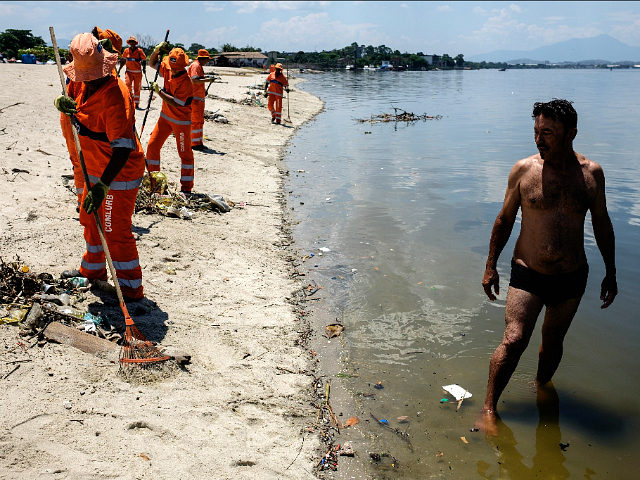Olympic sailors, practicing for the opening of the Games in August, say their venue, Rio de Janeiro’s Guanabara Bay, is so polluted their boats are turning brown from being in the water.
“It shouldn’t be this dirty. But there’s nothing we can do about it,” Finnish sailor Camilla Cedercreutz told the Associated Press. The notoriously polluted bay, nicknamed “the latrine” by locals, drew in a new oil slick on Monday that tarred the white boats completely. “We’ve never seen anything like this. It was all over the place,” Cedercreutz added. She noted that her boat turned so dark that other sailors told her, “your boat looks like a toilet.”
“The boats were completely brown,” added Spanish sailor Jordi Xammar. Xammar, who has previously sailed in the city, said that this was a noticeable improvement from how polluted the water was the last time he visited.
The Associated Press notes that World Sailing, “the governing body of the sport,” declined to issue a comment on the pollution threatening its athletes.
The 2016 Rio de Janeiro Summer Olympics have been threatened for months by a variety of factors: the Zika outbreak that has caused thousands of Brazilian infants to be born with severe neurological deformities; a growing crime spree in the face of the government not being able to afford to pay its police; crumbling or incomplete infrastructure designed specifically for the Olympics; and hospitals running out of basic supplies, among other problems.
The pollution is not limited to Guanabara Bay, though it is at its worst there. Scientists have found the presence of antibiotic-resistant “super bacteria” in numerous beaches in the city, including Copacabana, the site of Olympic beach volleyball. “The illnesses caused by these microorganisms are the same as those caused by common bacteria, but they require stronger antibiotics and, sometimes, can require hospitalization,” experts note.
Visible pollution also threatens beachgoers and athletes alike. Last week, beachgoers found a decayed human foot washing ashore at Copacabana. Police have been unable to identify the origin of the foot, noting it was so decayed it was impossible to tell the gender or age of the person to whom it belonged.
Should athletes get sick, the state of Rio’s hospitals is a dire one; doctors and nurses have not been paid in weeks in many cases and have been unable to keep a steady supply of basic supplies and common medicines coming in. The lack of police have also made hospitals a target for crime; at least one patient has been shot by roving gunmen who stormed Rio’s officially-designated Olympic hospital to rescue a drug lord recovering from a bullet wound.
The governor of Rio de Janeiro state, Francisco Dornelles, has demanded a federal bailout for his city so that he can pay police. He has said that Rio is in the position of deciding whether to pay police or fund the Olympics and cannot do both. Without the bailout, he warned, Rio could see “a total breakdown in public security, health, education, mobility and environmental management.”
Rio de Janeiro mayor Eduardo Paes has criticized Dornelles, saying the state has done a “terrible, horrible job” in an interview with CNN this week. “It’s completely failing at its work of policing and taking care of people,” he said, adding that he was optimistic the Olympics would be a successful event because “fortunately, the state will not be responsible for security during that period.”
In an interview with the Brazilian outlet O Globo, Paes lowered expectations, demanding tourists not expect a world-class event if they come to the Olympics. “We ask that people do not come here expecting Chicago, New York, or London. Compare Rio to Rio,” he asserted.
“The Rio 2016 Games will provide the best possible environment for peak performances,” promises the International Olympic Committee website. “Athletes will enjoy world-class facilities, including a superb village, all located in one of the world’s most beautiful cities, in a compact layout for maximum convenience.”

COMMENTS
Please let us know if you're having issues with commenting.